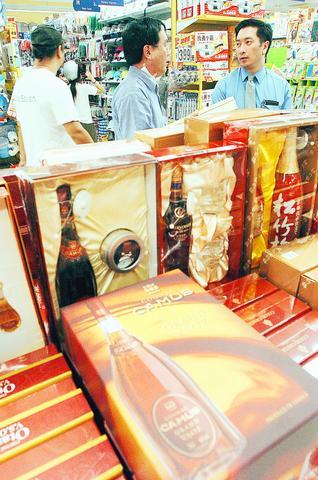Wine and spirits retailers are expecting their cash registers to be ringing busily all the way until the Mid-Autumn Festival in two weeks, as gift boxes recently began flying off the shelves, industry officials said yesterday.
The economic upturn and a dazzling array of liquor products available to consumers are the driving forces behind strong demand this year, officials added.

PHOTO: GEORGE TSORNG, TAIPEI TIMES
Morgan Hwang (黃營杉), chairman of Taiwan Tobacco and Liquor Corp (台灣菸酒公司), estimated that the buying period leading up to the festival is worth an estimated NT$2 billion. The Mid-Autumn Festival falls on the 15th day of the 8th lunar month, or Sept. 28 this year. A traditional holiday, the festival involves the giving of liquor and moon cakes to clients and friends.
In addition to the Mid-Autumn Festival, the Lunar New Year is viewed as another major selling period for the liquor industry.
To attract additional customers over the next two weeks, the liquor company yesterday showcased its 47 kinds of limited-edition wine and spirits gift sets, with some featuring designs by aboriginal artists in the hope of preserving Taiwan's unique cultures, Hwang said.
By integrating Chunghwa Post Co (中華郵政公司), which operates roughly 1,300 post offices nationwide, Hwang projected that up to 200,000 gift boxes would be sold, amounting to NT$300 million in profits, a four-fold increase over last year's sales.
"The sales performance will see a big jump, as the overall economy remains solid and all our employees are helping promote the gift boxes," Hwang said.
Maxxium Taiwan Ltd (寰盛洋酒), the importer of Remy Martin and Macallan, also expects a two-digit increase in sales this month thanks to the growth in customers' product preferences.
Maxxium Taiwan Ltd's brand manager Michael Lin (林庭蔭) said that an increasing number of consumers have developed a more refined palate and don't mind paying extra to obtain better-quality liquor.
High-end wine and liquor items, which range between NT$2,680 and NT$40,000 per box, will see the largest rate of growth -- to the tune of 20,000 boxes in the run-up to the Mid-Autumn Festival, Lin added.
In stark contrast to liquor retailers' high-end marketing drive, hypermarkets across the nation will feature much cheaper liquor boxes to lure price-conscious consumers.
Fiona Wang (王彤芳), marketing manager of RT-Mart (大潤發) said based on last year's experience, wine and spirits gift sets priced between NT$500 and NT$700 are more favorable to shoppers.
As a result, the 22-outlet operator slashed the average box price by 10 to 20 percent, with the goal of selling 300,000 liquor boxes, which would amount to NT$180 million in profits.
Sales among discount retailers is expected to grow over 20 percent during the run-up to the Mid-Autumn Festival, Wang said.

To many, Tatu City on the outskirts of Nairobi looks like a success. The first city entirely built by a private company to be operational in east Africa, with about 25,000 people living and working there, it accounts for about two-thirds of all foreign investment in Kenya. Its low-tax status has attracted more than 100 businesses including Heineken, coffee brand Dormans, and the biggest call-center and cold-chain transport firms in the region. However, to some local politicians, Tatu City has looked more like a target for extortion. A parade of governors have demanded land worth millions of dollars in exchange

An Indonesian animated movie is smashing regional box office records and could be set for wider success as it prepares to open beyond the Southeast Asian archipelago’s silver screens. Jumbo — a film based on the adventures of main character, Don, a large orphaned Indonesian boy facing bullying at school — last month became the highest-grossing Southeast Asian animated film, raking in more than US$8 million. Released at the end of March to coincide with the Eid holidays after the Islamic fasting month of Ramadan, the movie has hit 8 million ticket sales, the third-highest in Indonesian cinema history, Film

Taiwan Semiconductor Manufacturing Co’s (TSMC, 台積電) revenue jumped 48 percent last month, underscoring how electronics firms scrambled to acquire essential components before global tariffs took effect. The main chipmaker for Apple Inc and Nvidia Corp reported monthly sales of NT$349.6 billion (US$11.6 billion). That compares with the average analysts’ estimate for a 38 percent rise in second-quarter revenue. US President Donald Trump’s trade war is prompting economists to retool GDP forecasts worldwide, casting doubt over the outlook for everything from iPhone demand to computing and datacenter construction. However, TSMC — a barometer for global tech spending given its central role in the

Alchip Technologies Ltd (世芯), an application-specific integrated circuit (ASIC) designer specializing in server chips, expects revenue to decline this year due to sagging demand for 5-nanometer artificial intelligence (AI) chips from a North America-based major customer, a company executive said yesterday. That would be the first contraction in revenue for Alchip as it has been enjoying strong revenue growth over the past few years, benefiting from cloud-service providers’ moves to reduce dependence on Nvidia Corp’s expensive AI chips by building their own AI accelerator by outsourcing chip design. The 5-nanometer chip was supposed to be a new growth engine as the lifecycle